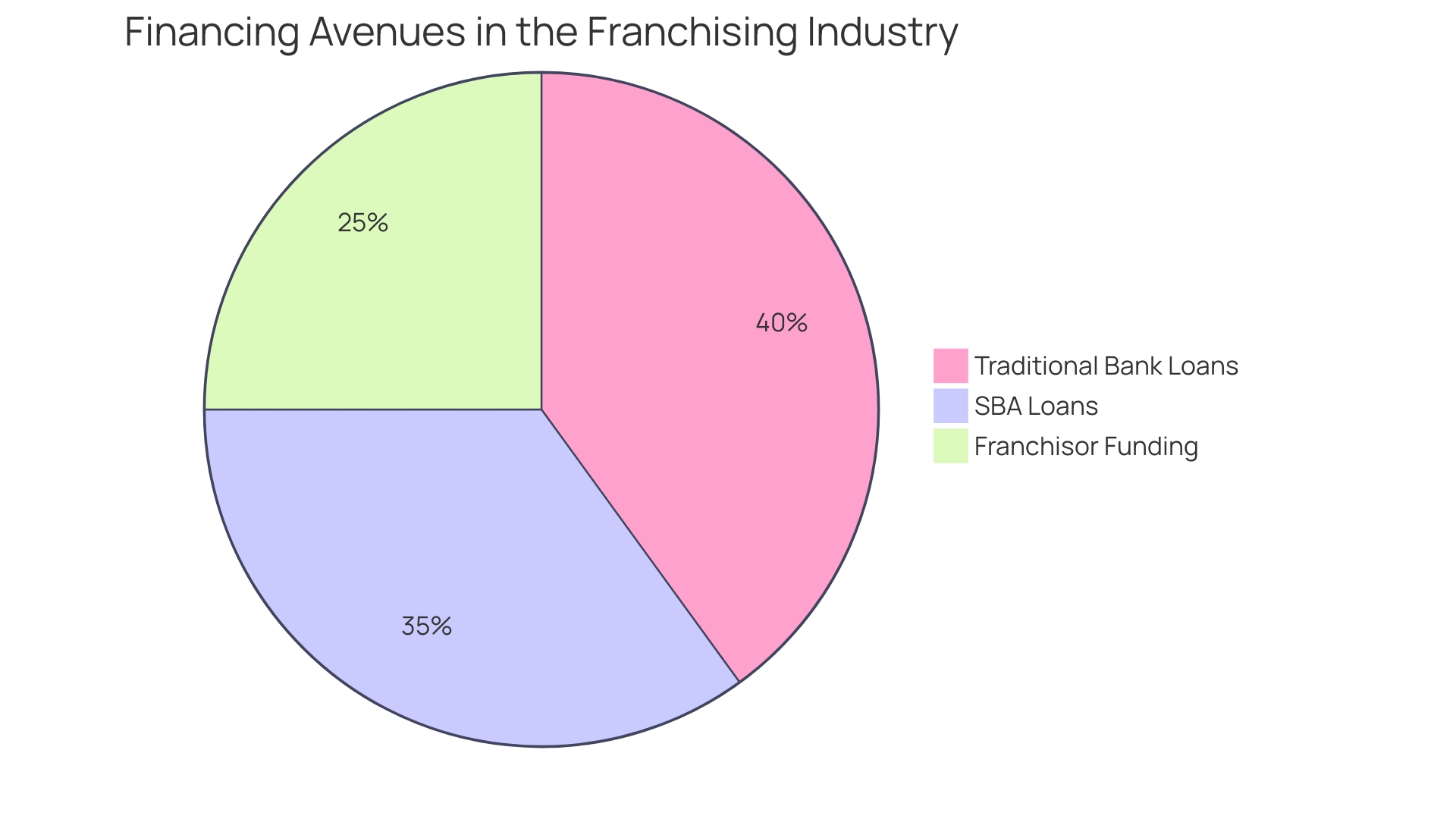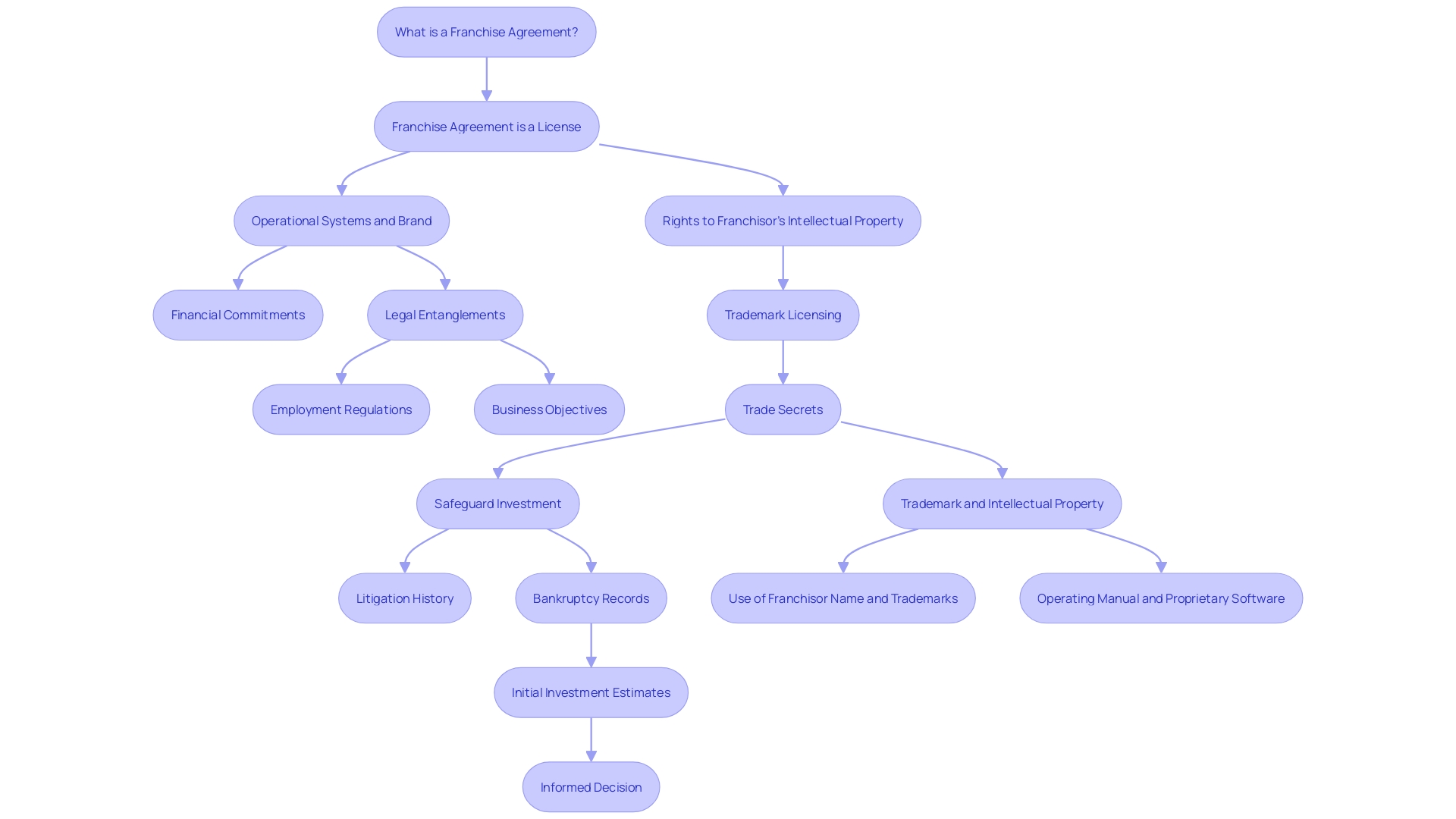Introduction
Are you considering a career transition and exploring franchise opportunities? Franchising can be a strategic avenue for individuals looking to step into business ownership with the support of a recognized brand. However, delving into the world of franchising requires a thorough understanding of the unique selling propositions of potential franchises, conducting due diligence, and assessing industry trends.
In this article, we will guide you through the essential steps to buying a franchise, the benefits of franchising, the franchise disclosure document (FDD) and legal requirements, franchise costs and fees, financing options for franchises, choosing the right franchise, key considerations for franchise success, franchise operations and management, and the franchise agreement and legal obligations. By providing practical advice and valuable insights, this article aims to equip you with the knowledge and guidance needed to navigate the complexities of franchise ownership and pave the way for a successful career transition.
Understanding Franchise Opportunities
Franchising stands as a strategic avenue for individuals aiming to step into business ownership with the backing of a recognized brand. When exploring the realm of franchising, it is crucial to understand the opportunities for business expansion offered. To begin, investigating the distinctive selling point of a potential business opportunity is essential. Questions like, “What’s the standout idea and who’s interested? Provide information about the sustainability of the business. A business must offer something innovative or a fresh perspective on an existing concept, ensuring it resonates with customers and stands out in the marketplace.
Before committing, it’s crucial to conduct thorough due diligence. Understanding the Franchise Disclosure Document (FDD), updated by the Federal Trade Commission in 2007, is fundamental. It outlines the duties and obligations of the business model and the prospective business partner. Assessing startup costs, potential earnings, and local market potential is part of this critical process. For example, evaluating the initial franchise fee, location development costs, and scrutinizing the average revenue and profit margins section of the FDD can help predict profitability.
The motivation behind franchising a business, akin to that of franchisees, is wealth creation. By leveraging other people’s capital and the franchisees’ local involvement, you can prove and scale a brand’s presence. The ultimate success of a business model is reflected in the triumph of its entrepreneurs, and building a system that leads to a billion-dollar valuation hinges on their prosperity.
Examining industry trends and analyzing financial projections is also advised. For example, the mobile oil change business model, such as Luby Dudes and Spiffy Green, is gaining traction because of consumer demand for convenience. These kinds of businesses maintain their services straightforward, concentrating only on oil and filter changes, utilizing a vacuum system for oil changes, and ensuring proper disposal of used oil.
Furthermore, staying abreast of the latest trends in the hospitality industry, which encompasses various categories such as recreation, lodging, entertainment, and food and beverage, is imperative. Despite the sector’s dynamic nature and the vast data available, it’s vital to stay informed to navigate the current job market and evolving customer expectations, particularly in the wake of significant shifts caused by global events.
In the end, discovering a business opportunity that matches your way of living, interests, and financial plan is the initial stage on the path to achieving success in the field of establishing a franchise. A customer-centric approach, where strong relationships and exceptional service are crucial, can greatly contribute to the success of a local franchise.

Benefits of Franchising
For those considering a career shift, franchising serves as a gateway to entrepreneurship with the added benefit of a safety net. It is a realm where instant brand recognition paves the way for commerce. When you start a franchised business, you’re not just purchasing a business; you’re investing in a proven model with a support system that has your back. You become part of a legacy that comes with an established customer base, alleviating the uncertainty of starting from scratch.
The beauty of franchising lies in its community and the collective wisdom it offers. Take, for instance, Floor Coverings International, which empowers its business owners with knowledge, such as the insights from Dan Sullivan’s ‘Who, Not How.’ This philosophy underscores the importance of assembling a team with the right skills, allowing you to focus on the ‘who’ rather than the ‘how’ of operations. Likewise, comprehending the ‘main concept’ behind a business is essential, as it establishes the atmosphere for its distinct value offering and attractiveness to customers.
Franchising is not just about riding on the coattails of a brand; it’s about customer-centricity. The core of a fruitful franchise lies in the ability to forge strong customer relationships, deliver exceptional service, and swiftly cater to consumer needs. It’s an ecosystem where customer service excellence directly boosts your business prospects.
Moreover, industry organizations such as the IFA (International Franchise Association) serve as proof of the strength of the business model, providing a platform for companies and individuals to flourish through education, support, and a tight-knit community network. With a focus on high standards and success stories, resources like the BFA Magazine provide real-world examples of individuals who have successfully made the transition to the world of franchising.
When exploring franchising opportunities, it’s essential to conduct thorough due diligence. The Franchise Disclosure Document (FDD), updated by the Federal Trade Commission, outlines the relationship between franchisees and franchisors, emphasizing the need for a clear understanding of roles and expectations. Recognized recognition is one of the franchise model’s most compelling advantages, as it brings consumer trust and familiarity, often translating into increased foot traffic and customer loyalty. This advantage is especially beneficial for new franchisees who can capitalize on the reputation of the business to rapidly build a solid customer base.
With franchising, the level of control you desire over your business can vary, but the ultimate goal remains the same: building a successful enterprise. By utilizing the capital and local presence of partners, you can contribute to a brand’s expansion and potentially establish a business model so successful that it becomes a highly desired acquisition.

Steps to Buying a Franchise
Embarking on ownership of a business system is like starting on a journey that requires careful navigation through several critical stages. It starts with a comprehensive investigation of enterprises, which can vary from groundbreaking portable oil change services like Luby Dudes, to various pet-related companies that provide versatility in operations. Each ownership opportunity comes with its distinctive operating framework and investment range, empowering potential proprietors to match their preferences and financial capacities.
The heart of the business process is the agreement, a pivotal legal contract that grants the franchisee the right to use the franchisor’s intellectual property, systems, and brand. This agreement is not merely a formality; it encapsulates the rights and responsibilities that will govern the commercial connection. It is crucial to comprehend that a licensed privilege is not merely an opportunity for trade, but it comes with strict guidelines and expectations.
Partnering with a business model also entails dedicating to a customer-centric strategy. The success of your business model depends on customer satisfaction, which results in repeat business and a strong reputation. Whether it’s the simple yet efficient service model of Luby Dudes or the varied offerings of a pet business, the ability to meet and exceed customer expectations is a cornerstone of business success.
Furthermore, the business landscape is dynamic and ever-evolving, as observed in the real estate sector, which is expected to achieve an estimated $3.81 trillion by the end of the year. This growth indicates the importance of staying current on market trends and competitive strategies to thrive in the franchising world.
In summary, purchasing a business opportunity is a multi-faceted process that goes beyond signing on the dotted line. It’s about finding the right fit, understanding the legal obligations, committing to customer excellence, and keeping a pulse on industry developments. By conducting extensive research and implementing a well-thought-out plan, you can successfully navigate the intricacies of owning a business opportunity and open up possibilities for a fulfilling entrepreneurial endeavor.
Franchise Disclosure Document (FDD) and Legal Requirements
An agreement serves as the foundation of any business model, defining the relationship between a parent company and a business partner. This crucial legal document is similar to a license, where the franchisor permits the franchisee to operate under its name and system. The business owner, in turn, gains the right to utilize the company’s intellectual property, such as trademarks, service marks, and proprietary systems, which is pivotal for maintaining uniformity and brand integrity across the business.
The Franchise Disclosure Document (FDD) is a crucial component of this process, providing a comprehensive view into the franchisor’s track record, financial performance, and the investment necessary to initiate the business. This includes a thorough examination of any litigation or bankruptcy history that might impact the decision to invest. The FDD also provides detailed information about the use of trademarks and intellectual property, which are crucial for the franchisee to carry out operations without legal consequences.
Understanding the FDD is not just about legal compliance; it’s about safeguarding one’s investment. With significant financial stakes at risk, the FDD and agreement collectively establish a framework for rights and obligations, ensuring that both parties are clear on the terms of their business relationship. Such transparency is intended to promote informed decision-making and contribute to the long-term success of the collaboration.
Franchise Costs and Fees
Exploring the realm of franchising involves a multitude of financial considerations. The journey starts with an initial fee, which gives you access to a franchisor’s established domain, enabling you to benefit from their intellectual property, systems, and brand recognition. This is followed by recurring costs such as royalty and marketing fees, which are your contribution to the continuous support from the franchisor and co-marketing efforts. Moreover, just like any business, operational expenses are an integral component of the daily operation of the enterprise.
Take for instance the iconic Subway franchise. Launching a Subway restaurant sets in motion with an initial investment, but it’s the potential returns that often entice entrepreneurs. With statistics revealing an average gross income of over $490,000 per year for a Subway outlet, and a net income ranging between $30,000 to $70,000 for franchisees, the allure is understandable. Nevertheless, these figures are not to be taken lightly, as they represent the culmination of strategic planning and adherence to the franchise agreement—a critical legal framework that delineates the symbiotic relationship between franchisor and franchisee.
The landscape of business expansion through the use of franchise models is constantly changing, influenced by factors such as wage inflation, regulatory changes, and supply costs. Forward-looking statements from industry leaders reflect an awareness of these variables and emphasize the necessity for prospective franchisees to stay informed about such dynamics. A well-informed decision, grounded in current financial and competitive data as well as a comprehensive understanding of the franchise agreement, can be the difference between a flourishing enterprise and a faltering endeavor.
Financing Options for Franchises
Navigating the financial landscape of franchising requires understanding the various financing avenues available. Franchisees must be prepared with a strong enterprise strategy and a clear understanding of the financial stability of the venture they intend to operate. This includes having detailed financial records such as bank statements, current debt, and income to demonstrate their capability to repay a lender. With terms varying significantly, traditional loans provided by banks or financial institutions can offer competitive rates but may be challenging to secure for small companies or new entrepreneurs. On the other hand, loans backed by the Small Business Administration (SBA) are designed to reduce the lender’s risk, which could potentially offer more favorable terms for franchise buyers. Moreover, franchisors themselves may provide funding initiatives customized to assist new franchisees in launching their enterprises.
Franchising, as highlighted by industry experts, presents an opportunity for entrepreneurs to operate under the umbrella of a larger, established brand, benefitting from the brand recognition and a proven business model. However, one must not underestimate the costs associated with financing a business model. The recent move by McDonald’s to increase royalty fees exemplifies the evolving financial considerations within the business model industry. Although not all businesses that grant franchises are expected to increase fees immediately, it is essential for individuals interested in becoming franchisees to stay informed about the potential for rising costs in the domain, including royalty fees that can vary significantly across different types of franchising. Aspiring business owners should carefully evaluate the financial implications before committing to a business opportunity, ensuring they have aligned their options with their financial reach and the current economic landscape of the industry.

Choosing the Right Franchise
Choosing the appropriate opportunity can greatly impact your entrepreneurial venture. It requires examining various elements such as aligning with your personal interests and skill set, understanding the current market demand, evaluating competition levels, and assessing the franchisor’s standing in the industry. It’s crucial to engage in comprehensive research and rigorous due diligence. This involves reviewing The Franchise Disclosure Document provided by the Federal Trade Commission, which offers insights into average revenue, profits, and the specific costs and fees associated with the business model. For instance, companies like Oxi Fresh provide transparency by allowing potential franchisees to request information on profits and revenue. Urban locations, with their heightened market saturation, might necessitate a higher initial investment due to operational costs. When considering a venture, it’s crucial to inquire about the distinctiveness of the idea and its attractiveness to consumers. For example, The Halal Guys witnessed customer queues around the block in New York City before expanding their operations, indicating a prosperous model. The decision to establish a franchising model should be based on the potential for growth and the success of existing franchisees, as your aim is to build a profitable and sustainable enterprise.

Key Considerations for Franchise Success
For those considering a franchise venture, achieving success hinges on multiple crucial factors. It begins with a compelling and unique concept that resonates with the target market—a concept so powerful that, as evidenced by the likes of The Halal Guys, customers will queue around the block.
Your business plan must be robust and reflective of the latest industry trends. For example, considering the franchising industry displaying a 2.85% rise in units year-over-year as of July 2023, it’s evident that growth is a crucial component of the success story. Yet, success isn’t solely measured by growth; the company’s ability to adapt to changing market conditions, such as evolving customer expectations or technological advancements, is also paramount.
Building a strong team is another cornerstone. As a franchisee, you’ll need to foster an environment of outstanding customer service, where each team member understands the value they bring to the table. Remember, excellent customer service isn’t just about meeting expectations; it’s about exceeding them and creating loyal customers who become evangelists for your brand.
Understanding and adapting to market trends is also key. With recent news indicating that royalty fees in the industry sector may be heading upward, staying informed and flexible could mean the difference between thriving and simply surviving. For example, McDonald’s recent adjustment of royalty fees from 4% to 5% highlights the importance of staying updated on economic changes in the field of business ownership through franchise agreements.
Ultimately, finding the appropriate business partnership involves taking into account factors that go beyond size and growth. As you explore the business model, legalities such as the Franchise Disclosure Document, and the economics of franchising, you are laying a foundation for success that is informed by both the big picture and the granular details of business operations. So, whether your dream is to own a bustling hotel chain or a neighborhood laundromat, your path to becoming a millionaire franchise begins with these strategic considerations.
Franchise Operations and Management
Running a business model not only involves the implementation of standardized procedures and ensuring quality control, it also includes mastering the art of persuasion to influence consumer behavior. Embracing the wisdom of Aristotle, businesses today still depend on logos, ethos, and pathos to achieve success. This means utilizing data and logical reasoning, establishing credibility, and appealing to emotions in marketing strategies. Additionally, franchises benefit from a systematic approach provided by franchisors, which includes comprehensive manuals and regular updates to the system, ensuring franchisees are equipped to overcome challenges and meet consumer demands effectively.
The foundation of any business’s operations is the franchise agreement, a legal document that defines the symbiotic relationship between franchisor and franchisee. This contract provides the license with the privilege to utilize the licensor’s intellectual assets, systems, and image, which is crucial for maintaining the uniformity and credibility of the business. By selecting the appropriate option and adhering to this agreement, franchisees can protect their investment and capitalize on the established reputation of the company to attract and retain customers.
Real-world success stories, like the expansion of Tims China with a goal to establish over 2,750 stores by 2026, exemplify the potential of a well-run business model. The brand emphasizes execution excellence and data-driven decisions, resonating with the idea that the company’s triumph hinges on the precise management of its operations. Similarly, The Marcus Corporation’s enduring presence in the entertainment and hospitality sectors since 1935 demonstrates the lasting impact of a business adept at navigating operational complexities. Their growth and diversification into theatres, hotels, and restaurants underline the importance of effective management in achieving long-term success.

Franchise Agreement and Legal Obligations
At the center of the franchise model lies the franchise agreement, a crucial legal document that outlines the relationship between a franchisor and a franchise. This contract serves as a license, empowering the franchise with the right to utilize the franchisor’s trademark, trade secrets, and operational systems. It is a cornerstone that facilitates the use of a franchisor’s well-established brand and intellectual property, enabling franchisees to embark on their new business ventures within a structured framework that upholds the brand’s integrity and operational standards.
The agreement is not just a formality but a safeguard for both parties’ investments. For franchisees, it grants legal rights that protect their financial commitment and the future of their enterprise. As such, it is critical to thoroughly comprehend the clauses and stipulations, which include detailed insights into the franchisor’s historical legal entanglements, bankruptcy filings, and projections of initial financial outlays. In addition, the agreement defines and regulates various aspects of employment, such as job responsibilities, supervision, hiring and firing practices, and workplace conditions, as recently underscored by legal definitions set by the National Labor Relations Board. Given the potential for franchisors to be classified as joint employers, it is crucial to understand the impacts of such determinations on the relationship between the franchisor and franchisee.
Essentially, the agreement of the franchise is the plan that directs all operational and legal aspects of the franchisee’s undertaking, making it an essential instrument for those seeking to explore the realm of franchising. It offers a comprehensive view of the obligations and rights that come with opening and operating a franchise, ensuring that both franchisor and franchisee are aligned in their business objectives and practices.

Conclusion
In conclusion, buying a franchise requires thorough research, understanding of the Franchise Disclosure Document (FDD), and careful consideration of the unique selling proposition of potential franchises. It is important to choose a franchise that aligns with your interests, evaluate market demand, and assess the franchisor’s standing in the industry.
Building strong customer relationships and delivering exceptional service are key factors in franchise success. Financial considerations, including franchise costs and fees, should be carefully evaluated, and exploring financing options can help secure funding for your franchise venture.
Franchise operations and management involve implementing standardized procedures, ensuring quality control, and utilizing effective marketing strategies. The franchise agreement serves as the foundation for operations, granting the franchisee the right to use the franchisor’s intellectual property and systems.
Ultimately, the franchise agreement is a crucial legal document that defines the relationship between the franchisor and franchisee. It is important to thoroughly understand and adhere to the agreement to ensure a successful franchise venture.
By following these steps and considerations, you can navigate the complexities of franchise ownership and pave the way for a rewarding career transition. Remember that buying a franchise is not just about acquiring a business; it is about investing in a proven model with the support of an established brand. With thorough research and a strategic approach, you can increase your chances of success and embark on a fulfilling journey as a franchise owner.


